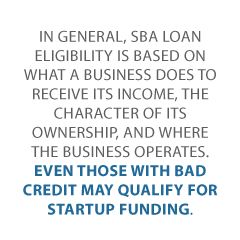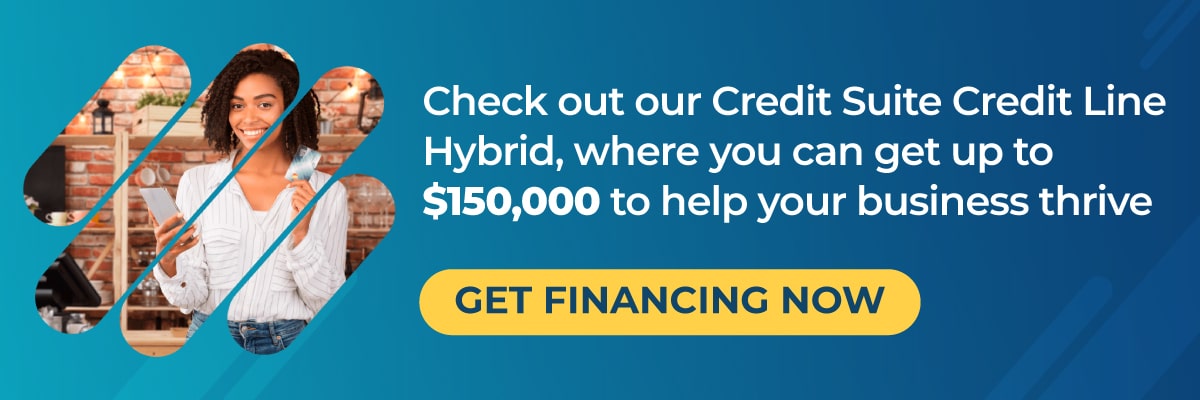Can SBA Lending Help Your Business?
While not every business will qualify, SBA lending can benefit many companies. Is yours one of them?
What Does the Small Business Administration Do?
The SBA is a government agency with one real mission, to fund small businesses and otherwise help them succeed, while supporting the overall economy of the United States. This independent agency was created in 1953, “to aid, counsel, assist and protect the interests of small business concerns, to preserve free competitive enterprise and to maintain and strengthen the overall economy of our nation”.
Eligibility for SBA Loans
 Lenders and loan programs have unique eligibility requirements. In general, SBA loan eligibility is based on what a business does to receive its income, the character of its ownership, and where the business operates. Even those with bad credit may qualify for startup funding.
Lenders and loan programs have unique eligibility requirements. In general, SBA loan eligibility is based on what a business does to receive its income, the character of its ownership, and where the business operates. Even those with bad credit may qualify for startup funding.
Normally, businesses must meet size standards, be able to repay, and have a sound business purpose. The lender will provide you with a full list of eligibility requirements for your loan. See https://www.sba.gov/document/support–table-size-standards.
More Requirements
General eligibility also includes being a for-profit business. Also, the business must be officially registered and operating legally, doing business in the US. This means the business must be physically located and operating in the US or its territories.
The owner much have vested equity. This means the owner must have invested their own time or money in the business, and exhausting other funding options. In short, the business must not be able to get funds from any other financial lender.
SBA Lending May Include More Coronavirus Funding Options
This information does change, depending on what Congress passes and the president signs into law. Many of these options have their own eligibility periods and funding. Even if one doesn’t currently have funds, others could. It pays to check all available options.
SBA Lending Includes Economic Injury Disaster Loans
An EIDL loan provides economic relief to small businesses and non-profit organizations currently experiencing a temporary loss of revenue. Small business owners and non-profit organizations in all US states, Washington DC, and territories are eligible to apply.
EIDL proceeds can be used to cover a wide array of working capital and normal operating expenses, like continuation to health care benefits, rent and utilities, and fixed debt payments.
Agricultural businesses with 500 or fewer employees are now eligible for EIDL loans. The 500 or fewer employees is a general requirement for most types of businesses, unless a larger business is still considered small under the SBA’s own standards. Principals with 50% or more of an ownership interest must be up to date on child support payments.
The business cannot derive more than 1/3 of its gross annual revenue from legal gambling activities.
SBA Lending Can Come in the Form of SBA Express Bridge Loans
An SBA Express bridge loan enables small businesses which currently have a business relationship with an SBA Express lender, to access up to $25,000 quickly. These can be term loans or they can be used to bridge the gap while applying for an EIDL loan. This loan will be paid in whole or in part from the proceeds from the EIDL loan.
SBA Debt Relief
The SBA will pay 6 months of principal, interest, and any associated fees that borrowers owe for all current 7(a), 504, and microloans in regular servicing status, as well as new 7(a), 504, and microloans disbursed before 9/27/20. This relief is not available for Paycheck Protection Program loans or EIDL loans. Borrowers do not need to apply for this assistance.
The SBA will automatically provide this relief as follows: for loans not on deferment, SBA will start making payments with the next payment due on the loan. They will make six monthly payments. For loans currently on deferment, SBA will start making payments with the next payment due after the deferment period has ended. In this case, they will also make six monthly payments. For loans made after 3/27/20 and fully disbursed before 9/27/20, SBA will start making payments with the first payment due on the loan. Again, they will make six monthly payments.
SBA lenders have been instructed to not collect loan payments from borrowers. If a borrower’s payment was collected after 3/27/20, lenders were told to inform the borrower that they have the option of having the loan payment returned by the lender or applying the loan payment to further reduce the loan balance after the SBA’s payment.
More SBA Debt Relief
This is for current SBA Serviced Disaster (Home and Business) Loans. If your disaster loan was in ‘regular servicing’ status on 3/1/20, the SBA is providing automatic deferments through 12/31/20. But automatic deferral has some specifics.
Interest continues to accrue on the loan. 1201 monthly payment notices will continue to be mailed out. They will show the loan is deferred and no payment is due. The deferment will not cancel any established Preauthorized Debit (PAD) or recurring payments on a loan. Borrowers with an established PAD through Pay.Gov or an online bill pay service are responsible for canceling these recurring payments.
But borrowers that had the SBA establish a PAD through Pay.gov must contact their SBA servicing office to cancel it.
Borrowers preferring to continue making regular payments during the deferment period may continue to do so during the deferment period. The SBA will apply those payments normally as if there was no deferment. After this automatic deferment period, borrowers must resume making regular principal and interest payments. Borrowers that cancelled recurring payments will need to reestablish the recurring payment.
SBA’s Lender Match
The SBA has a lender matching tool whereby you can connect with SBA-approved CDFIs and small lenders. CDFIs are community development financial institutions. They are private financial institutions with a 100% dedication to delivering responsible, affordable lending. This is to help low-income, low-wealth, and other disadvantaged people and communities join the economic mainstream.
Lender Match is only for SBA-guaranteed loans. Do not use it for EIDL loans. You can get a match within 2 days. This can save time as you will receive contact information only for lenders expressing an interest in providing your business with a loan.
SBA Lending Includes Traditional SBA Loans
The SBA still provides three types of loans which predate the COVID-19 pandemic. They are 7(a), 504, and microloans.
SBA 7(a) Loans
This is the SBA’s main program for providing financial assistance to small businesses. Terms and conditions, like the guaranty percentage and loan amount, may vary by type of loan.
A standard 7(a) loan can be for up to $5 million. The maximum SBA guarantee is 85% for loans up to $150,000 and 75% for loans greater than $150,000. The interest rate varies but cannot exceed the SBA maximum. Turnaround is 5 – 10 business days.
Lenders do not have to take collateral for loans up to $25,000. For loans over $350,000, the SBA requires that the lender collateralize the loan to the maximum extent possible up to the loan amount. If business fixed assets do not fully secure the loan, the lender may include trading assets. This is done by using 10% of current book value for the calculation.
Plus the lender must take available equity in the personal real estate (residential and investment) of the principals as collateral. See sba.gov/partners/lenders/7a-loan-program/types-7a-loans.
SBA CAPLines
This is a program under 7(a). It helps small businesses meet short-term and cyclical working-capital needs. There are four types of CAPLines: seasonal, contract, builders, and working.
Seasonal CAPLines
With the Seasonal CAPLines program, borrowers must use the loan proceeds solely to finance the seasonal increases of accounts receivable and inventory — or in some cases associated increased labor costs. It can be revolving or non-revolving.
With the Contract CAPLines program, the line finances the direct labor and material cost associated with performing assignable contracts. It can be revolving or non-revolving.
Builders CAPLines
With the Builders CAPLines program, the line can finance direct labor and material costs for a small general contractor or builder constructing or renovating commercial or residential buildings. The building project serves as the collateral. It can be revolving or non-revolving.
Working CAPLines
So this program is an asset-based revolving line of credit. It is for businesses unable to meet credit standards associated with long-term credit.
This program provides financing for cyclical growth, recurring and/or short-term needs. Repayment comes from converting short-term assets into cash, which is paid to the lender. Businesses continually draw from this line of credit, based on existing assets. And they repay as their cash cycle dictates. This line generally for businesses that provide credit to other businesses.
SBA Lending Includes SBA Express
This program is also under 7(a). It features an accelerated turnaround time for SBA review. The SBA will respond to your application within 36 hours. Get up to $350,000. The maximum SBA loan guarantee is 50%. Lenders do not have to take collateral for loans up to $25,000. They may use their existing collateral policy for loans over $25,000 up to $350,000.
SBA 504 Loans
Also called the Certified Development Company Loan program. CDCs are nonprofit corporations promoting economic development within their communities via 504 loans. The SBA authorizes CDCs to provide financing to small businesses with the help of third-party lenders (often banks). Loans are generally at a $5 million cap.
But certain eligible energy-efficient or manufacturing projects may qualify for more than one 504 loan. So these can be for up to $5.5 million each.
A low down payment (often 10%) conserves your working capital. So you can get 10, 20 or 25 year terms. Use for long-term, fixed assets for expansion or modernization. This is often real estate or large equipment. Refinancing of large equipment and/or owner-occupied commercial real estate may also be possible. See sba.gov/brand/assets/sba/sba-lenders/504-Loan-Fact-Sheet-Borrower-Version.pdf.
SBA Lending Includes SBA Microloans
So this program provides loans up to $50,000. The idea behind these loans is to help small businesses and specific not-for-profit childcare centers start up and expand. So the average microloan is about $13,000. Often, intermediaries require some type of collateral and the personal guarantee of the business owner. See sba.gov/loans-grants/see-what-sba-offers/sba-loan-programs/microloan-program%20.
Alternatives to SBA Loans
Of course there are alternatives to SBA loans. Not eligible? Or do you need more? There are plenty of alternatives to SBA loans out there. But it will depend on your business’s age and revenue, and your FICO score. But there are options out there for you. Credit Suite can help you navigate the choices.
SBA Lending: Takeaways
The Small Business Administration has various eligibility requirements, and a number of different types of loans. The SBA has stepped up during the COVID-19 pandemic. But they also have more traditional loans with different funding sources. Always check the fine print with any loan you apply for. And don’t forget that Credit Suite can help you choose your best funding option.

